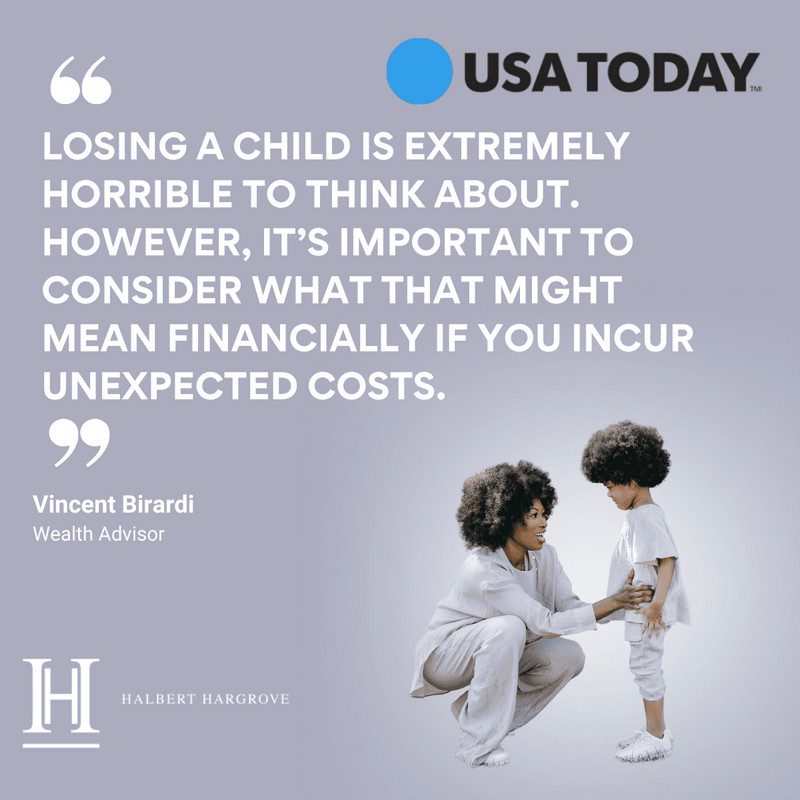By: Rebecca Lake and Jennifer Lobb, USA Today featuring Wealth Advisor Vincent Birardi, CFP®, AIF®
Key points
- Future insurability is one reason to purchase life insurance for children.
- Some children’s life insurance policies can accumulate cash value.
- It’s important to shop around to find the best life insurance for kids.
Buying life insurance for yourself is something that might be on your to-do list. Your policy can provide financial protection for your loved ones after you die.
But what about life insurance for children? Is that something you need if you’re a parent?
Purchasing life insurance for kids could make sense if you’re worried about guaranteeing your child’s future insurability.
“I’ve seen situations where later in life children get illnesses and they’re not insurable,” said Barbara A. Pietrangelo, chair-elect at Life Happens.
“If coverage is taken out at younger ages, these children still have that coverage later in life.”
Having kids’ life insurance can offer other benefits as well, but it may not make sense for every family. Understanding how children’s life insurance works and what it may cost can help you to decide whether getting coverage is worth it.
What is child life insurance?
Child life insurance is a life insurance policy that’s designed to cover a minor child. In terms of how it works, it’s not that different from life insurance for adults.
When you purchase a kids’ life insurance policy, you’re entering into a contract with the insurance company. As the policyholder, you pay premiums for a policy that protects the insured — your child.
As the policyholder, you may also be the primary beneficiary, unless you choose to name someone else. Should your child pass away while the policy is in force, the insurance company would pay out a death benefit to you.
Child life insurance policies are usually whole life insurance policies, though some term life insurance policies are available.
With a whole life insurance policy, coverage lasts for the child’s lifetime, as long as the premiums are paid, locking in low rates at an early age. Purchasing a whole life insurance policy for your child will also ensure their insurability later in life, even if they eventually develop a medical condition that would make it difficult to secure coverage otherwise.
If you have a life insurance policy and don’t want to purchase whole life insurance for your child, you may be able to add a limited amount of coverage by adding a child term rider to your policy. By doing so, you’ll insure your child until they are no longer eligible for coverage, typically when they become a certain age or get married. With a child rider, you often have the option to convert the policy to permanent coverage.
Should you get life insurance for kids? online pharmacy buy bactrim no prescription with best prices today in the USA
Whether or not you should get a child life insurance policy can depend on your situation.
Future insurability is often the top priority among parents who purchase a child life insurance policy. If you’re worried your child may not be able to secure a life insurance policy later because of a health issue, insuring them while they’re still young can alleviate that fear.
You may also consider life insurance for kids if you’re interested in using it as an investment vehicle, said Vincent Birardi, certified financial planner and wealth advisor at Halbert Hargrove.
Cash value is another reason some parents consider life insurance for kids.
Child life insurance policies may offer a cash value component. In that case, a portion of the premium is paid into an interest-bearing account. Cash value can then be withdrawn or borrowed against later in life, while your child is alive.
For instance, Pietrangelo said she’s worked with grandparents who took out life insurance policies for their grandchildren, then allowed them to use the accumulated cash value to put money down on a home.
Policies she purchased for her own children provided cash to pay for college and first cars.


